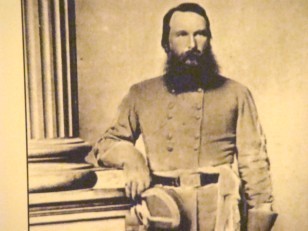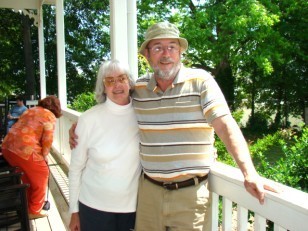GAINESVILLE - You don't have to go far to find the name Longstreet in Gainesville. The last name of General James Longstreet is on a medical facility, a restaurant, a street sign...and it is the name of a society devoted to the study and memory of the man General Robert E. Lee called his 'Old War Horse.'
It is also the name of a man who came to be despised by his fellow Southerners during the bitter post-war Reconstruction period, but the reason his name is so commonplace in Gainesville is because it is the town he came to know and love, and he found prosperity here. When he died here in 1904 from an old war wound he suffered in 1864, 5,000 people attended his funeral at Alta Vista Cemetery.
Clark Thornton, from Atlanta, is General Longstreet's great-great grandson and attended the Longstreet Society's recent 2011 bivouac held at the restored section of the Piedmont Hotel, which the General owned and ran after he came to live in Gainesville.
Thornton began his search for the General, encouraged by his aunt, and learned his ancestry comes down through his mother's side of the family through Maria Louisa Longstreet, who was the General's youngest daughter.
"He was a man of conviction," Thornton said. "He always seemed to have the right answer for the situation whether it was in battle or whether it concerned what the South should do after the war. It was not until many years later that people finally admitted he was right in his decision to try to work with the government as it existed right after the Civil War. There was some really bad feeling and at that time the South was having a terrible time."
Thornton said the General wanted to try to help and gave up a lot to try to achieve the goal of healing and reunification.
"He could have sat back and not done a thing," Thornton recalled. "Instead he outlined what he thought people should do and what he was going to do himself, and that was to work within the limits that the government had set, the Reconstruction Acts is what it was."
That meant joining the ruling political party, the Republican Party, despised by Southerners as the party that brought harsh Reconstruction policies.
"His biggest contribution after the war was his sacrifice to help heal the South," according to Thornton. "Up until recently people would not give him credit whatsoever, he was considered a traitor because he joined the side of the enemy and a lot of that came from lies, stories made up by his political enemies who even claimed that Longstreet and Lee became enemies."
Longstreet, in reality, considered Lee an older brother.
As a Gainesville businessman, he promoted the town with his Piedmont Hotel, a short distance from the train station, and it brought to town a lot of guests and famous people including a young Woodrow Wilson, who became America's president during the First World War.
The General is even credited with setting the stage for Gainesville becoming 'Poultry Capital of the World.' A lot of chicken was served at the Piedmont and farmers grew chickens and supplied them to the hotel.
"After the War he had a lot of political difficulty," said Maria Lagonia from Mamaroneck, New York, near White Plains, who was put in charge of the Longstreet Society newsletter after she complained to society members her newsletter was missing.
"When he came here from New Orleans people were a little skeptical because they were not sure of his loyalties, but over time he proved himself to be a good loyal Southerner," Lagonia said.
Part of that skepticism was because Longstreet was a Republican and because he and Union Army commander U.S. Grant were good friends, a friendship that went back to their West Point days, a friendship that continued through and after the war. Longstreet accepted office appointments from Grant.
Lagonia also said the truth about Longstreet's role at the Battle of Gettysburg is surfacing, thanks to Michael Shaara's Pulitzer Prize winning novel 'The Killer Angels', and the Ted Turner motion picture 'Gettysburg', based on the novel.
"They had to find somebody besides Lee to blame, and since Longstreet was cooperating with the Republicans he seemed like a good target," Lagonia said. "He was a great general; General Lee praised him without question. After the war, when he got into political trouble, people tried to re-write his Civil War history, but during the four years of the war he was a great general."
Lagonia was also visiting the Piedmont for the Longstreet Society bivouac and is not sure how a Northerner could get interested in a Southern Civil War general, except that she did knew practically nothing about him.
"I started doing some reading, I kind of like the underdog and don't like people being treated unfairly and there's something about Longstreet's personality that's very appealing," she said.
Lagonia met Longstreet Society members 15 years ago while working with the Memorial fund to erect a battlefield monument. She's been involved ever since, and now, there is a monument to General James Longstreet at Gettysburg and in Gainesville at his home place, known as Longstreet Hills.
(EDITOR'S NOTE: This is another in an occasional series AccessNorthGa.com will publish this year marking the 150th anniversary of the start of the Civil War. Some, such as this piece, will be generated by AccessNorthGa.com staff members, with an emphasis on - but not limited to - northeast Georgia's role in the war and the impact it had on our region. Others will be the work of the Associated Press.)
Friday
May 17th, 2024
7:34AM












